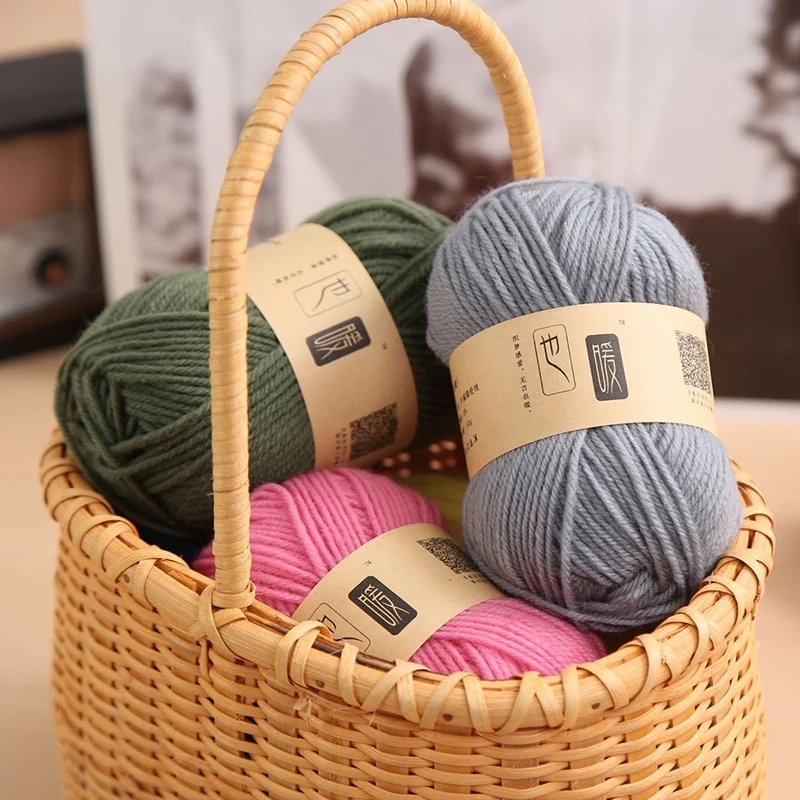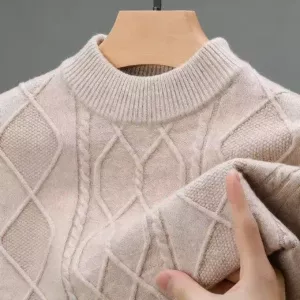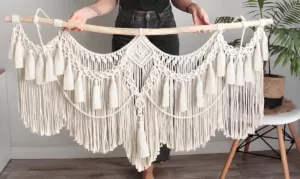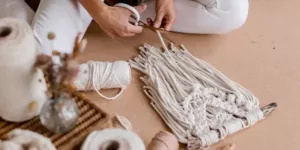Why Milk Cotton Yarn – In a world where environmental consciousness is gaining significant traction, the crafting community is no exception to the movement towards sustainability. As crafters seek to harmonize their passion for creating with their desire to protect the earth, the materials they choose play a pivotal role. Enter milk cotton yarn, an innovative and eco-friendly alternative that is capturing the attention of environmentally-conscious hobbyists and professionals alike.
But what is milk cotton yarn exactly? This intriguing material is a blend of milk protein fibers and traditional cotton, offering a sustainable option for those looking to minimize their ecological footprint without compromising on the quality of their craft. As we see a surge in the adoption of ‘green’ materials, milk cotton yarn stands out as a choice that can make a tangible difference, not just in the final product, but in the greater scheme of the crafting industry and the environment.
Understanding Milk Cotton Yarn
Milk cotton yarn is a unique fusion that combines the natural properties of cotton with the remarkable qualities of milk protein fibers. The result is a soft, durable, and eco-friendly yarn that’s perfect for a wide range of crafting projects. Its composition ensures that it retains the breathability and comfort of cotton while enhancing it with the silky texture of milk protein fibers.
The production process of this hybrid yarn typically involves extracting casein, the main protein found in milk, and spinning it into fibers that can be woven with cotton. This innovative method of production not only reuses a byproduct of the dairy industry but also leads to the creation of a yarn that’s as versatile as it is sustainable.
Moreover, the biodegradable nature of cotton milk yarn sets it apart from synthetic counterparts that contribute to landfill waste. Not only does this contribute to a decrease in environmental impact, but it also aligns with the crafting community’s growing commitment to using renewable and earth-friendly resources.
Whether you’re an avid knitter, a crochet enthusiast, or simply someone who appreciates the artistry behind textiles, milk cotton yarn offers a sustainable choice that doesn’t sacrifice quality. As we delve deeper into its advantages, it’s clear that this innovative yarn is not just a trend, but a transformative step toward a greener future in crafting.
Environmental Benefits of Milk Cotton Yarn
Reduced Waste
One of the standout environmental benefits of milk cotton yarn is its efficient use of materials that would otherwise represent waste in the dairy industry. During the production of dairy products, certain proteins such as casein are often discarded. The innovative process behind milk cotton yarn repurposes these proteins, transforming them into valuable fibers for yarn production. This not only helps reduce waste but also adds value to what is typically considered a byproduct.
Although specific statistics on waste reduction directly attributable to the use of milk proteins in yarn production are sparse, it’s recognized that dairy byproducts are plentiful, with millions of tons potentially unexploited each year globally. Using these byproducts not only helps address the issue of waste but also promotes a circular economy.
Energy and Resource Efficiency
Milk cotton yarn also stands out for its energy and resource efficiency compared to synthetic fibers. Synthetic fibers, such as polyester, are petroleum-based and require an intensive manufacturing process that consumes significant amounts of energy and water. In contrast, the production of milk cotton yarn integrates natural and renewable resources which typically demand less energy.
Moreover, the water footprint of milk cotton yarn is considerably lower than that of many other fibers. Cotton, although water-intensive, when blended with milk proteins, which require comparatively little water beyond what is already used in dairy processing, results in a fabric that’s more resource-efficient. This reduction is crucial in an era where water scarcity is becoming a pressing environmental and social challenge.
Lower Carbon Footprint
The carbon footprint of milk cotton yarn is influenced positively by practices such as local production and processing. By sourcing and manufacturing the yarn locally, transportation emissions associated with moving materials over long distances are significantly reduced.
Furthermore, the overall life cycle of milk cotton yarn—from the sourcing of materials to production, usage, and eventual disposal—typically results in lower carbon emissions when compared to synthetic alternatives. This is largely due to the biodegradable nature of milk cotton yarn, which ensures that it returns to the earth without leaving harmful residues, unlike many synthetic fibers that contribute to microplastic pollution and long-term ecological damage.
In conclusion, not only does milk cotton yarn help craft a beautiful product, but its environmental benefits provide compelling reasons for choosing it over less sustainable options. This commitment to sustainability is essential as the crafting community continues to align its practices with broader ecological values.
Health and Safety Aspects
Non-Toxic Dyes and Processing
Milk cotton yarn is often celebrated not only for its environmental benefits but also for its commitment to safety and health, particularly in its dyeing and processing methods. Manufacturers of milk cotton yarn typically use natural or low-impact dyes that are free from harmful chemicals commonly found in synthetic dyeing processes. This approach ensures that the yarn remains free of toxins, making it safer for both the environment and the end-users.
Moreover, milk cotton yarn is known for its hypoallergic properties, owing largely to the gentle nature of both milk protein fibers and organic cotton. This makes it an excellent choice for individuals with sensitive skin, including babies, as it minimizes the risk of allergic reactions and skin irritations that can sometimes be provoked by synthetic fibers or chemically intensive natural fibers.
Certification and Standards
Milk cotton yarn often holds certifications that reassure consumers of its safety and eco-friendliness. Common certifications include:
- OEKO-TEX® Standard 100: This is a global standard that tests for harmful substances in textiles. A product with this certification guarantees that every component has been tested for harmful substances and that the article therefore is harmless in human ecological terms.
- Global Organic Textile Standard (GOTS): Widely regarded as the world’s leading processing standard for textiles made from organic fibers, this standard defines high-level environmental criteria along the entire organic textiles supply chain and requires compliance with social criteria as well.
Products holding these certifications not only meet high environmental and social standards but also assure consumers that the materials and processes used in the production of milk cotton yarn adhere to stringent safety protocols. This is particularly important in an industry where exposure to toxic chemicals can be a significant health hazard.
The presence of such certifications significantly enhances the appeal of milk cotton yarn to consumers who are cautious about the environmental impact and health implications of their purchasing decisions. By opting for certified milk cotton yarn, crafters and consumers participate in a broader movement towards sustainability and safety in textiles, contributing to a healthier planet and population.
The Crafting Experience with Milk Cotton Yarn
Quality and Durability
Milk cotton yarn is renowned for its exceptional texture and strength, which contribute to the longevity of crafted items. The unique blend of milk protein fibers and organic cotton results in a yarn that is both soft and durable, making it a preferred choice for many textile projects. This yarn holds shape well over time and withstands wear and tear, ensuring that items retain their aesthetic appeal and functional quality even after extensive use.
Testimonials from crafters:
- Emma, an avid knitter: “Milk cotton yarn is a delight to work with. It has a luxurious feel that doesn’t fade even after multiple washes. It’s definitely my go-to for baby clothes and blankets due to its softness and durability.”
- John, a textile artist: “I’ve used various types of yarns, and milk cotton yarn stands out for its robustness. It maintains its tension perfectly, making my finished projects look crisp and professional every time.”
Versatility in Crafting
Milk cotton yarn is incredibly versatile, suitable for a wide array of crafting projects. Its gentle texture and strength make it ideal for both wearables and home décor items. Projects such as baby garments, scarves, hats, and even luxurious bath textiles benefit from its hypoallergenic and soft properties. Additionally, its robust nature makes it suitable for more structural projects like tote bags and baskets.
Unique properties ideal for specific crafts:
- Softness and hypoallergenic: Perfect for baby clothing and accessories. These properties ensure that the yarn is gentle on sensitive skin, making it a safe choice for newborns and those with allergies.
- Durability: Ideal for everyday items like reusable shopping bags and kitchen towels, where frequent usage and washings are expected.
- Thermal properties and moisture absorption: Excellent for crafting winter garments and cozy throws, providing warmth without causing overheating, thanks to the breathability of the fibers.
Based on the information provided, here’s how the sections could be constructed:
Supporting Sustainable Practices in Crafting
In the world of crafting, every choice we make, from the materials we select to the designs we bring to life, has an impact on the environment. Woven Futures, centered around creating social and environmental change, exemplifies how one can blend artisan craftsmanship with sustainable practices. By choosing materials and crafting routines that prioritize the health of our planet, we collectively contribute to a positive change in the broader industry.
Tips for a More Sustainable Crafting Routine:
- Prioritize Organic and Upcycled Materials: Opt for yarns and crafting materials that are organic or made from upcycled materials. This reduces waste and supports a more circular economy.
- Zero Waste Crafting: Embrace practices that minimize waste, such as using every bit of your material and repurposing leftovers for new projects.
- Conscious Shopping: Support brands and businesses that are committed to environmental stewardship and social responsibility. Your purchasing power is a tool for positive change.
- Learn and Share: Educate yourself about the impacts of different crafting materials and share your knowledge with the crafting community. The more we know, the better choices we can make.
Where to Find Milk Cotton Yarn
For crafters eager to incorporate milk cotton yarn into their projects, Woven Futures offers an excellent starting point. Though the specific listing for milk cotton yarn was not directly mentioned in the scrape results, the commitment of Woven Futures to organic cotton and upcycled materials aligns with the values surrounding milk cotton yarn’s production.

Cotton Candy Milk Yarn Best Yarn for Crochet
Cotton Candy Milk Crochet Yarn, a harmonious blend of 100% pure cotton and premium acrylic fibers designed for the modern artisan. This 4ply medium coarse wool type yarn is the cream of the crop when it comes to crafting cozy baby sweaters, whimsical scarves, and comfortable clothing.
Purchasing Milk Cotton Yarn from Woven Futures:
- Navigate to WovenFutures.com, a platform that centers its business model on creating both social and environmental change. The focus on organic cotton and upcycled materials, along with a zero-waste philosophy, indicates a thoughtful approach to product selection.
- Explore the yarn and materials section for options that suit your crafting needs. If milk cotton yarn is not immediately visible, consider reaching out to Woven Futures directly for inquiries about future stock or recommendations for similar sustainable alternatives.
- Remember, supporting businesses like Woven Futures contributes to a larger movement towards sustainable and ethical yarn production. By choosing to shop with purpose, you make a statement about the importance of social and environmental responsibility in crafting.
By embracing these sustainable practices and supporting businesses committed to positive change, crafters can make a substantial impact on both the industry and the planet.








